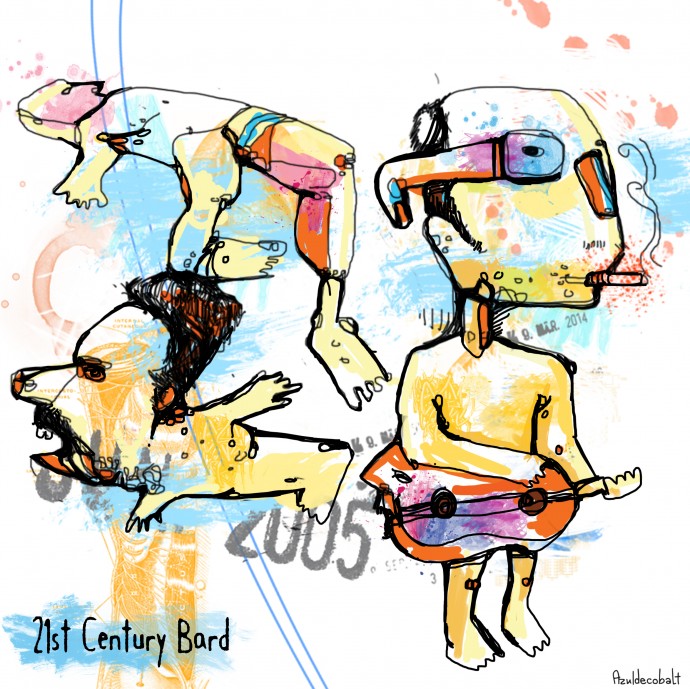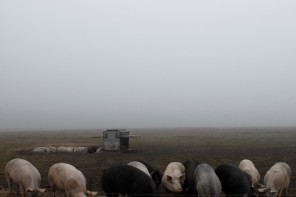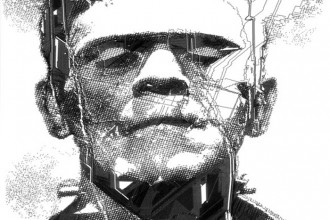The role of the bard was once crucial in many cultures. Bringing the gift of storytelling, singing, and poetry, these entertainers were required to attend bardic college before ever being given the permission to perform publicly, and were highly respected within the community. Many centuries, however, have passed since then. In today’s world it seems the role of the bard is also to keep this magical tradition alive. Sensa Nostra talked to Welsh bard Ivor about this age-old craft, and its role in a 21st-century society.
My father was a carpenter by trade, and a bard at family events, or in pubs. It was something that his father enjoyed too, and all of the songs my father sung were directly passed down from generation to generation. Many of the stories were too, with new added sections or what-have-you to keep it fresh. The music was always old Celtic, which is my main influence today. By the time I was a teenager I could recite all the humourous poems to my friends, and I began playing music from a very early age. It was not long before I was performing live, and telling stories along with music just came naturally. I guess I drifted out of the scene for a few years, but as I grew a little older I fell back in love with it and the lifestyle. So it is nearly twenty years now that I have been doing this. First I was playing up and down Britain, then abroad. I realise the importance of continuing this art form and I feel it is my duty to keep it alive.
While it was just a local event in a Welsh village with my old man, I have been blessed to travel the world doing this. People really connect on another level. It is what I call the nourishment of the soul! There is a strong connection between bard and listener. The mood of the room can fluctuate greatly with a good bard and the audience always leaves the performance feeling somewhat enriched. In my experience, no matter who the individual is, he or she will feel that they joined part in something charming and unique.
I live in a small village in Wales with my wife and her mother, who we take care of. I like to do about two to three local gigs a week. Now that my kids are all grown up, I have more freedom in deciding if I want to travel long distances or not. You cannot afford to be turning down gigs because you feel too tired to travel—no gig means no money. It is very simple. I do maybe three long-distance gigs a month, to Scotland or England. The promoters or venue owners set me up with free accommodation if needed. A phone call comes every few months inviting me to the far corners of the world, all expenses paid. Who could complain? In my younger days I would tour for long lengths of time, up and down every road of Britain. I guess I have played a song or two in nearly half of the pubs in Britain at this stage. I take things slower nowadays, but traveling is still a necessity. If you are prone to travel sickness or homesickness, this is certainly not the thing for you. I guess you could compare the lifestyle to any touring musician. It can get tiring of course, but I am in no situation to complain. Traveling is part and parcel of being a bard.
I try to practise material in general for about three hours a day. When I am on the road I could be glued to a new instrument I recently bought, or, on the other hand, I could just be reading a book for a weekend. It always varies, and it all depends on what mood you find yourself in. You are your own boss, which is fantastic, but also you have to carry all the responsibilities. This includes transport and getting to the gig in due time, meeting with organisers, planning schedules, and having your material ready and polished for the performance. Because I like to challenge myself, I am forever writing new material or learning from friends or heroes in the trade. I never want to become stale; heaven forbid someone see me perform the exact same set twice. It is a vibrant way of life that keeps you young in spirit.
I try to balance old, classic material with my own in my set. If I am performing a piece from three hundred years ago I educate the audience beforehand about the piece and its composer. This in itself is a huge part of the performance. And maybe half of my set is my own material, or from current fellow bards. I don’t speak Spanish, but I sometimes play two songs I learned from a street musician I met in Madrid. It is important to keep everything up to date, as well as respecting the old stuff. If not, it would just seem stale and old-fashioned. Just a relic of the past. Keeping material relevant is essential, and a true bard always understands that. There is no use in clinging to the ideals of the 15th century and wishing we could all be transported back to those days. Unfortunately I see it too often. But then again within every profession you have your undesirables.
Whatever way you look at it, the world is forever changing in all aspects, has done and will continue to do so. That is inevitable. The stance of the bard is no exception, but the candle stubbornly refuses to extinguish. It is that timeless spirit that lives in the craft that I adore. It is something that refuses to die—or worse, to conform. Self-promotion through internet or media is not required, nor is it something I would ever do. I listen to music from the internet and I have no problem with it, but I want to keep it as personal and intimate as possible. It is the physical experience of the show that I want to keep intact. I sell my CDs at the shows, which allows me to meet some great people, such as my wife. The tradition has survived solely on word of mouth for hundreds of years—so if it ain’t broke, don’t fix it!
To be fortunate enough in this day and age to be able to make a living as a bard, which I do, is a testament in itself to its enduring appeal. I feel blessed not only for that but to continue meeting people from all corners of the world, and learning new, interesting material from them. Those are things my father and grandfather were never able to do. My wife opened up a workshop three years ago in our village, which has been just wonderful. All we do is get together once a week and be creative. We do not teach as such, but more give tips and advice. Our youngest in the group is seven, and our oldest is over seventy. The interest that the youth have in it is quite uplifting. I am constantly meeting up-and-coming, talented bards on the scene. I could certainly learn a thing or two from a few that I have had the pleasure to see. The future is safe and sound with the bardic tradition, and I dare say it is more prominent today than it was twenty-five years ago. People will always come back to this classic form of entertainment. It needs no electricity. Just a gathering of people, and every soul loves a good story and song.







